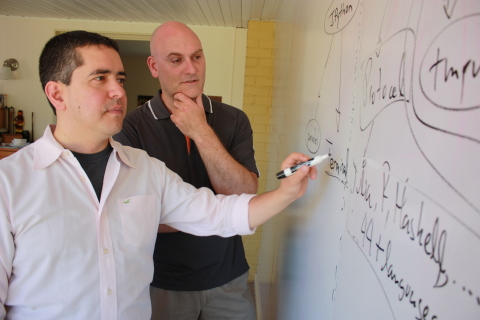reproducible research
See the following -
$6M for UC Berkeley and Cal Poly to Expand and Enhance Open-Source Software for Scientific Computing and Data Science
 Three foundations pledged $6M over the next three years to Project Jupyter, an open-source software project that supports scientific computing and data science across a wide range of programming languages via a large, public, open and inclusive community. Fernando Perez of University of California, Berkeley and Lawrence Berkeley National Laboratory and Brian Granger of California Polytechnic University, San Luis Obispo will lead the project at their institutions. Perez and Granger’s efforts with Project Jupyter are the result of their work developing IPython, a popular user interface for interactive computing across multiple programming languages.
Three foundations pledged $6M over the next three years to Project Jupyter, an open-source software project that supports scientific computing and data science across a wide range of programming languages via a large, public, open and inclusive community. Fernando Perez of University of California, Berkeley and Lawrence Berkeley National Laboratory and Brian Granger of California Polytechnic University, San Luis Obispo will lead the project at their institutions. Perez and Granger’s efforts with Project Jupyter are the result of their work developing IPython, a popular user interface for interactive computing across multiple programming languages.
- Login to post comments
2013 Scientific Computing With Python Conference (SciPy 2013)
The scientific computing in Python community has been rapidly blossoming over the years thanks to its ability to quickly analyze data in an interactive way, and for its ability to act a glue language that integrates code and data from a variety of environments. [...] Read More »
- Login to post comments
A Web-native Approach to Open Source Scientific Publishing
 This summer, eLife was pleased to launch Executable Research Articles (ERAs) in partnership with Stencila, allowing authors to post computationally reproducible versions of their published papers in the open-access journal. The open source ERA technology stack delivers a truly web-native format that treats live, interactive code as a first-class asset. It was developed to address current challenges around reproducing and reusing published results-challenges mostly caused by the lack of infrastructure for publishers to showcase the richness and sophistication of the computational methods used by researchers in their work.
This summer, eLife was pleased to launch Executable Research Articles (ERAs) in partnership with Stencila, allowing authors to post computationally reproducible versions of their published papers in the open-access journal. The open source ERA technology stack delivers a truly web-native format that treats live, interactive code as a first-class asset. It was developed to address current challenges around reproducing and reusing published results-challenges mostly caused by the lack of infrastructure for publishers to showcase the richness and sophistication of the computational methods used by researchers in their work.
- Login to post comments